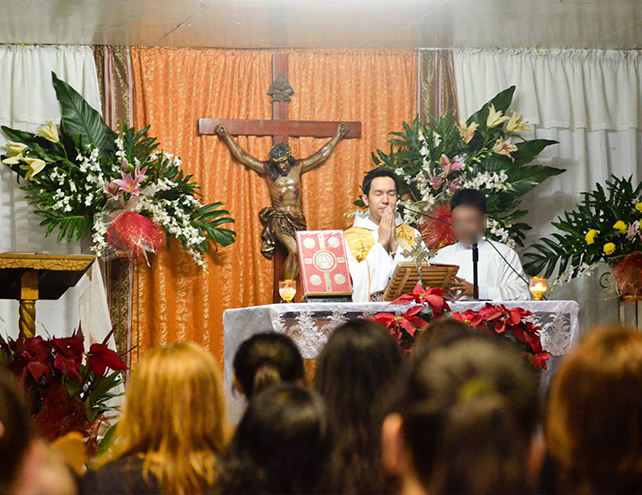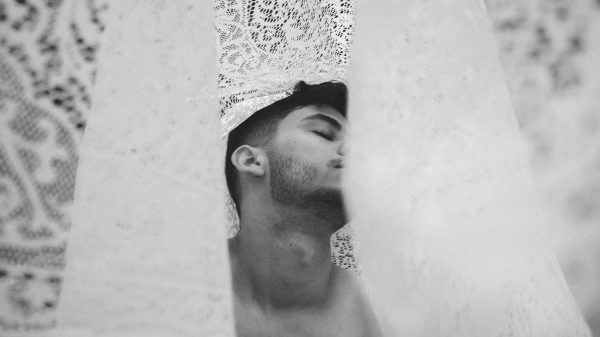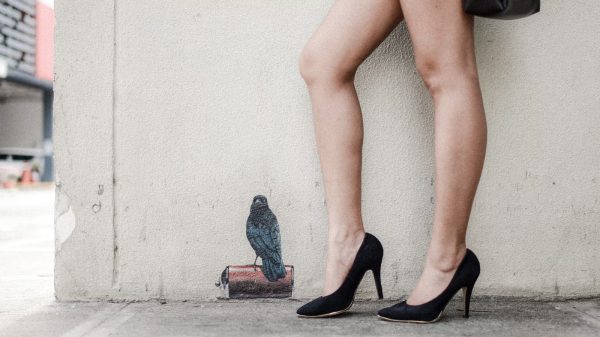This is part of #KaraniwangLGBTQIA, which Outrage Magazine officially launched on July 26, 2015 to offer vignettes of LGBT people/living, particularly in the Philippines, to give so-called “everyday people” – in this case, the common LGBTQIA people – that chance to share their stories.
As Outrage Magazine editor Michael David C. Tan says: “All our stories are valid – not just the stories of the ‘big shots’. And it’s high time we start telling all our stories.”
RJ knew he’s gay since puberty. “I was attracted to guys,” he said, adding – with a smile – that “even my wet dreams were about guys.”
But after graduating from college, RJ had a calling.
“I felt the call to the priesthood,” he said.
And so RJ became Father RJ, a Roman Catholic priest.
By becoming one, Fr. RJ therefore became one of the members of the LGBT community who chose to dedicate their lives to serving an institution that is not necessarily welcoming of them.

GAY OF FAITH
Gay tales in the church are not exactly new, with these tales emanating all the way from Vatican, and with even the Papacy involved. The likes of Pope John XII (who reigned from 955 to 964), Boniface VIII (r. 1294-1303), Paul II (r. 1464-1471), and Sixtus IV (1471-1484) had reigns that were marred with gay-related (substantiated or not) controversies. If any, these highlight how the gay issue has always been around in the Roman Catholic Church.
In “Gay Priests”, author and sociologist James Wolf estimates that as much as 48.5% of priests may be gay. This is within the 15% to 50% range estimated by Amanda Ripley of Time Magazine; and only slightly higher than the figure posited by Rev. Thomas Crangle, a Franciscan priest in Passaic, N.J., whose survey in 1990 reported that about 45% of his respondents said that they’re gay.
But the exact number is hard to substantiate because of the seeming “Don’t ask, don’t tell” policy within the church that, if violated, could have ecclesiastical and societal ramifications. This is because church teachings continue to be antagonistic particularly with LGBT-related behaviors (e.g. same-sex relationships and marriage, and gender transition), promoting a “hate the sin, love the sinner” stance.
And so, while the church does not deny that there are gay priests, the official position is that they are not welcome.
There is a Vatican document from 1961 that bars persons with homosexual orientation from ordination and religious vows. This document, approved by Pope John XXIII, stated: “Advancement to religious vows and ordination should be barred to those who are afflicted with evil tendencies to homosexuality or pederasty, since for them the common life and the priestly ministry would constitute serious dangers.”
A “newer” document pertaining this was released in 2005, this time signed by Pope Benedict XVI. It states: “The church, while deeply respecting the people in question, cannot admit to the seminary and the sacred orders those who practice homosexuality, present deeply rooted homosexual tendencies or support so-called gay culture’. Those people find themselves, in fact, in a situation that presents a grave obstacle to a correct relationship with men and women. One cannot ignore the negative consequences that can stem from the ordination of people with deeply rooted homosexual tendencies.”
The same document tries to be more tolerant of those with “homosexual tendencies that are merely the expression of a transitory problem… as in the case of an unfinished adolescence”, though it stresses that the homosexual tendencies must “have been clearly overcome for at least three years before ordination as a deacon.”
CHANGING TIMES?
Supposedly reflecting the changing of times, the new – and current – Pope Francis was once deemed to be more tolerant of the LGBT community as a whole. This may be largely attributed to a soundbyte he delivered during an impromptu press conference aboard the papal jet, when he said: “If a person is gay and is searching for the Lord and has goodwill, who am I to judge him?” He also said – in another instance – that the church should apologize to LGBT people for mistreating them; gave VIP seats to a group of LGBT Catholics on a pilgrimage to Rome; met with a transgender man from Spain; and met with a gay former student, the man’s partner and friends in the US.
But – only this December 2016 – Pope Francis signed a document called “The Gift of the Priestly Vocation”, which upheld that “persons with homosexual tendencies” are barred from Roman Catholic seminaries and the priesthood.
It is particularly the latter that Fr. RJ finds “hurtful and disappointing”.
“I reject the idea that gays are not fit to be priests,” Fr. RJ said. “Those statements versus gay priests, which were copied from ideas first put forth under the pontificate of Pope Benedict XVI, are evil, cruel and outright discriminatory. Those are not coming from the Holy Spirit.”
RAINBOW BEHIND THE PULPIT
These very statements also discourage other gay priests to come out, he said; or even for others who may not be gay to become vocal advocates of LGBT human rights.
“I don’t see any contradiction between (my) being gay and being a priest,” Fr. RJ said. “There is no contradiction. There are surely a lot of LGBT saints in the history of the church.”
Even as he is an openly gay priest, “the limits for me are the same as for other Roman Catholic priests. As consecrated religious, we profess vows of poverty, obedience and chastity,” Fr. RJ said.
Fr. RJ acknowledges that there are those who may not agree with him being in the church. Yet he’s appreciative that “most, if not all, of my companions, including my superiors, are supportive of me,” he said.
OUT AND ABOUT
Incidentally, Fr. RJ is also open about his sexuality to his dad and two brothers (their mother passed away in 2012).
“Sometime in 2014, my Dad asked me (about my sexuality) while the two of us were together in the car. I think my message alert at that time was Vice Ganda; he took the opportunity to ask me, ‘Anak, bakla ka ba?’ I took several deep breaths. I said to myself, ‘If I deny it now, another opportunity might never come up again’. So I replied, ‘Oo’. I kept silent after saying ‘Oo’. To fill the awkward silence, Daddy started mumbling comforting stuff, saying ‘Okay lang ‘yun‘ and quoting Pope Francis,” Fr. RJ said. “We have been super closer since then, even exchanging news articles on LGBT issues.”
Fr. RJ came out to his brothers through text a week or so after coming out to their father. “One replied: ‘It’s no big deal’, the other replied: ‘It’s not a problem’.”
For Fr. RJ, support – particularly if/when coming from family members – is very important because “I can ignore the haters because I know that I’m accepted by my family, and that’s what matters.”

LOVE IS NOT A SIN
In the past, Fr. RJ admitted having been in a same-sex relationship. “This has helped me realize that love is definitely not a sin,” he said. “Love is from God because God is love.”
And since the Roman Catholic Church that he belongs to continues to be infamous for its “hate the sin, love the sinner” position, Fr. RJ said: “I know and believe that Christ is pro-LGBT. Mama Mary is the mother and defender of LGBT people.”
Fr. RJ added: “Being LGBT is not a sin. Logically, therefore, LGBT love and LGBT relationships are not sinful.”
But he recognizes that many LGBT people have been hurt by their faith – in the Philippines in particular, by the Roman Catholic Church. Their “courage” to continue following their faith serves as an inspiration to Fr. RJ.
“I feel joy in my heart whenever I see LGBT people attending Mass, praying in the church, or practicing Catholic devotions. I am inspired by their bravery and strength despite the hurt inflicted by homophobic Roman Catholics,” Fr. RJ said. “To my LGBT brothers and sisters: There will always be haters. The haters will misuse the name of God to justify their hate. Ignore them. As Ms. Melanie Marquez said, ‘I won’t stoop down to my level!’”
The founder of Outrage Magazine, Michael David dela Cruz Tan completed BA Communication Studies from University of Newcastle in NSW, Australia; and Master of Development Communication from the University of the Philippines-Open University. He grew up in Mindanao (particularly Kidapawan and Cotabato City), but he "really came out in Sydney" so that "I sort of know what it's like to be gay in a developing, and a developed world". Conversant in Filipino Sign Language, Mick can: photograph, do artworks with mixed media, write (DUH!), shoot flicks, community organize, facilitate, lecture, and research (with pioneering studies under his belt). He authored "Being LGBT in Asia: Philippines Country Report", and "Red Lives" that creatively retells stories from the local HIV community. Among others, Mick received the Catholic Mass Media Awards in 2006 for Best Investigative Journalism, and Art that Matters - Literature from Amnesty Int'l Philippines in 2020. Cross his path is the dare (guarantee: It won't be boring).

































































